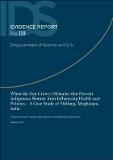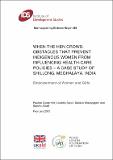| dc.contributor.author | Oosterhoff, P | |
| dc.contributor.author | Saprii, L | |
| dc.contributor.author | Kharlyngdoh, D | |
| dc.contributor.author | Albert, S | |
| dc.coverage.spatial | India | en |
| dc.date.accessioned | 2015-02-26T11:33:50Z | |
| dc.date.available | 2015-02-26T11:33:50Z | |
| dc.date.issued | 2015-02 | |
| dc.identifier.citation | Oosterhoff, P.; Saprii, L.; Kharlyngdoh, D. and Albert, S. (2015) When the Hen Crows: Obstacles that Prevent Indigenous Women from Influencing Health-care Policies – A Case Study of Shillong, Meghalaya, India, IDS Evidence Report 119, Brighton: IDS | en |
| dc.identifier.uri | https://opendocs.ids.ac.uk/opendocs/handle/20.500.12413/5868 | |
| dc.description.abstract | Meghalaya is a landlocked and largely agrarian state in northeast India with an approximate population of three million. Various government surveys report that roughly half the state lives below the poverty line. Most people live in rural areas, but in recent years Meghalaya has experienced rapid population growth and urbanisation: between 2001 and 2011, Meghalaya’s cities grew 20 per cent. This has put increasing pressure on urban areas. Today, one out of five people in the capital of Shillong are slum dwellers.
Meghalaya is part of India’s ‘tribal belt’, with a predominantly indigenous population (86 per cent), of which the Khasi constitute slightly more than half. The Khasi are one of the largest matrilineal cultures in the world, with distinct political institutions that coexist alongside India’s modern state system. Identities in the indigenous group are closely linked with maternal lineage: the children take the name of their mother’s clan, and traditionally, the youngest daughter in a family inherits the ancestral land of her family.
Despite living in a matrilineal society, when it comes to health and education, women in Meghalaya lag behind their peers in other northeastern states. The state has some of the worst maternal health indices and the highest unmet contraceptive need in India. One of the reasons for the women’s low status is the position of Khasi women in their communities – they do not participate in traditional political decision-making, which historically is a male domain. Khasi women are barred from even attending decision-making processes. There is an old saying among Khasis: ‘Ynda kynih ka ‘iar kynthei, la wai ka pyrthei’ or ‘When the hen crows the world is coming to an end.’ It is taken to mean that if women take part in politics, the world is doomed.
This paper examines how the Indian state prioritises health needs, and how and whether poor and indigenous women are able to participate in decisions about their sexual and reproductive health. The focus is on the indigenous Khasi population in Meghalaya, with its traditional systems of governance that exist in tandem with India’s modern institutions. Literature and document reviews, documented participation through interviews and focus group discussions at these different levels in Shillong help explain what opportunities and barriers women have for political participation. | en |
| dc.description.sponsorship | UK Department for International Development | en |
| dc.language.iso | en | en |
| dc.publisher | IDS | en |
| dc.relation.ispartofseries | IDS Evidence Report;119 | |
| dc.relation.ispartofseries | IDS Evidence Report Brief;119 | |
| dc.rights.uri | http://creativecommons.org/licenses/by/3.0/ | en |
| dc.subject | Gender | en |
| dc.subject | Health | en |
| dc.title | When the Hen Crows: Obstacles that Prevent Indigenous Women from Influencing Health-care Policies – A Case Study of Shillong, Meghalaya, India | en |
| dc.type | IDS Evidence Report | en |
| dc.rights.holder | IDS | en |
| dc.identifier.ag | OT/11009/3/2/2/92 | |
| dc.identifier.ag | OT/11009/3/2/2/93 | |



